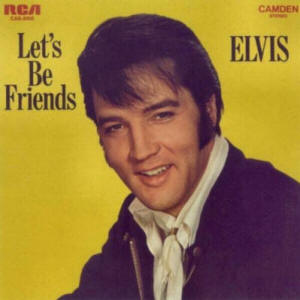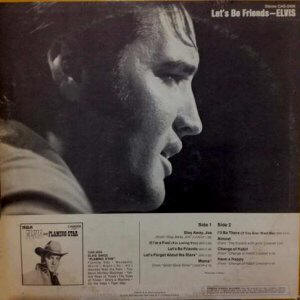

The first Presley album of 1970 was a budget
release by CAMDEN. It hit the stores in April
and entered Billboard's "Top LPs Chart" on May
9th. "Let's Be Friends" stayed for eleven weeks,
but never charted any higher than number 105.
This was caused by the low price. To avoid
"bought" chart successes by price dumping,
Billboard calculated the charts by using the
value in USD. With sales of 400,000 "Let's Be
Friends" certainly would have made it into the
top 20, if it had been a full price release.
However, the RIAA calculated their awards by
sold units and so the album was certified Gold
(1999) and Platinum (2004). In the UK the charts
were also calculated by sold units and therefore
"Let's Be Friends" made it to number 12. In
continental Europe the long player was quite
popular, too. In total RCA Victor / CAMDEN was
able to sell 2 million units, which translates
to 300 million paid streams.
In 2016 the complete Presley catalogue was
restored and remastered by Vic Anesini for a
boxed set of 60 compact discs called "The Album
Collection". Sony Music Entertainment provides
the streaming platforms with the same versions
of the individual albums (with "Dainty Little
Moonbeams", "Girls! Girls! Girls" (Finale),
"Plantation Rock", "Let Us Pray" and "Who Am I"
as bonus tracks), albeit in 24 bit/90 khz flac.
That means, if the platform of your choice
supports high resolution audio, you can enjoy
the tracks in the same quality Sony used to scan
and master them. On Spotify, which has a market
share of approximately 30% and is the only
platform that publishes streaming figures,
"Let's Be Friends" accumulates 6.3 million streams
and is requested 2.3 thousand times per day. In
total "Let's Be Friends" ranks a tad above the
unpopular mid-sixties soundtracks.
Elvis' look on the cover was already known
from the single "Suspicious Minds" / "You'll
Think Of Me", because CAMDEN used a picture
of
the same session. The photos had been made in
October of the previous year to promote the MGM
movie "The Trouble With Girls (And How To Get
Into It)". The backside of the sleeve was made
up with a photo from the rehearsals for the tv
special "SINGER presents Elvis". Of course it
also featured an advertising for the king's
previous CAMDEN release "Elvis Sings Flaming
Star & Others".
After the success of "Elvis Sings Flaming
Star" CAMDEN made a deal with Elvis for another
four budget albums, which were to be released
between Easter 1970 and Easter 1971. It was also
agreed upon an option to issue another two
albums in 1971. The king received a
non-refundable advance payment of $300,000,
which was to be settled with the actual sales of
these releases. By using our very rough factor
of 15 to translate the payment to the present,
we can estimate that Elvis would have received
4.5 million USD today. The deal was a win-win
situation. The label could release albums
without having to collect new songs, rent
studios or hire staff and the king was paid
without having to do anything. "Let's Be
Friends" was filled with movie tunes that had
not been released on records yet and two
leftovers from the previous year's sessions in
Memphis. In total the album contained ten tracks
and had a running time of 21:23 minutes.
Stay Away, JoeThe album
starts with the title song of the movie "Stay
Away, Joe". It was written by Ben Weisman and
Sid Wayne, on October 1, 1967 Elvis recorded 19
takes of the tune at RCA Studio B in
Nashville/Tennessee and selected his 17th
attempt as the master. For a possible record
release the band also recorded a rhythm track.
They needed two takes and an unknown number of
insert-takes. After the music track was edited,
Elvis added his vocals. Musically "Stay Away,
Joe" fits the theme of the movie, but it's
certainly no highlight.
If I'm A Fool (For Loving You)
This ballad was written by Stand Kesler and
recorded by Elvis on February 20, 1969 at
American Sound Studio in Memphis/Tennessee.
He needed nine takes for this sentimental
country song, strings and harmony voices were
added on March 25th. In the song the narrator
claims not to care if the love of his lady is
real, as long as she lets him believe it is.
Compared to the tracks on "From Elvis In
Memphis" (1969) and "From Memphis To Vegas / From
Vegas To Memphis" (1969) this song is a tad on
the weak side, but it's still worth listening to
and therefore it's a good solution to release it
on a budget album like this.
Let's Be Friends
The title song of this long player was recorded
on March 5, 1969 at Decca Universal Studio in
Hollywood/California. The king put three takes
on tape as well as several workpart-takes of the
ending of the song. The master was spliced of
take 3 and an unknown workpart-take. "Let's Be
Friends" was recorded for the Universal picture
"Change Of Habit", but finally wasn't used. Dr.
John Carpenter (Elvis) was supposed to sing the
ballad to an autistic girl, therefore the lyrics
seem a little strange if one doesn't know the
background. The song was written by Chris
Arnold, David Martin and Geoff Morrow and can be
regarded as a mediocre movie tune.
Let's Forget About The Stars
Here we have another movie song, that wasn't
used. "Let's Forget About The Stars" was written
by A.L. Owens for the western "Charro!" and
recorded on October 15, 1968 at the Samuel
Goldwyn Studios in Hollywood/California. The
band put the rhythm track on tape within two
takes, Elvis needed five attempts to add his
voice to the playback. The singer begs his loved
one, to listen to her heart and ignore the
astrology. It's a really nice ballad and it
would have been a pity to leave it in the
vaults.
Mama
In the movie "Girls! Girls! Girls!" (1962) the
ballad was sung by The Amigos. For a possible
record release Elvis had also produced a version
of this song, but finally it was decided to do
without this track of 58 seconds. And so CAMDEN
used the short song by Charles O' Curran and
Dudley Brooks to fill this budget album. The
song is somewhat kitschy, but there are
certainly worse movie tunes than "Mama".
I'll Be There
This song was written and recorded by Bobby
Darin in 1959. Elvis followed him on January 22,
1969 at American Sound Studio in
Memphis/Tennessee. He recorded six takes and
selected the thrid attempt for post-production
and release. Chips Moman, the producer of the
session, added harmony vocals (January 24th),
strings (May 5th) as well as horns and
additional harmony vocals (May 6th). Just like
"If I'm A Fool (For Loving You)" this one also
was too weak for the release on "From Elvis In
Memphis" or "From Memphis To Vegas / From Vegas
To Memphis", but certainly too good to be left
in the vaults.
Almost
In this ballad the singer regrets that he and
his loved one never got together. Elvis sings
with a lot of emotion and sells this short song
in a believable way. Buddy Kaye and Ben Weisman
had written "Almost" in 1967, but the king
recorded it a year later for the MGM movie "The
Trouble With Girls (And How To Get Into It)". On
October 23, 1968 at United Recorders in
Hollywood/California he needed 31 takes to do
so, later strings (May 7, 1969) and horns (May
8, 1969) were added.
Change Of Habit
Half a year after the movie had premiered in the
US, the fans were able to buy the title song.
The singer advises certain people to reconsider
their behaviour patterns, in compliance to the
movie the lyrics play with the double meaning of
the word "habit". Elvis recorded "Change Of
Habit" on March 5, 1969 at Decca Universal
Studio in Hollywood/California within six takes.
Today the song is often overlooked by fans and
critics, but to me it's one of the king's best
movie tunes.
Have A Happy
The album ends with another track from "Change
Of Habit". It was also recorded at Decca
Universal Studio in Hollywood/California, but
this time on March 6, 1969. Elvis needed seven
takes to reach a satisfactory result. The song
was written by Ben Weisman and Buddy Kaye and
can be compared to the many mediocre movie
ballads of the mid-sixties.
Verdict
The budget release offered ten
tracks that had not been available on
records before. Many of the songs are a tad
on the mediocre side, but in total "Let's Be
Friends" is much better than many of Elvis'
soundtrack albums.

(C) RCA Records
/ CAMDEN
![]()

